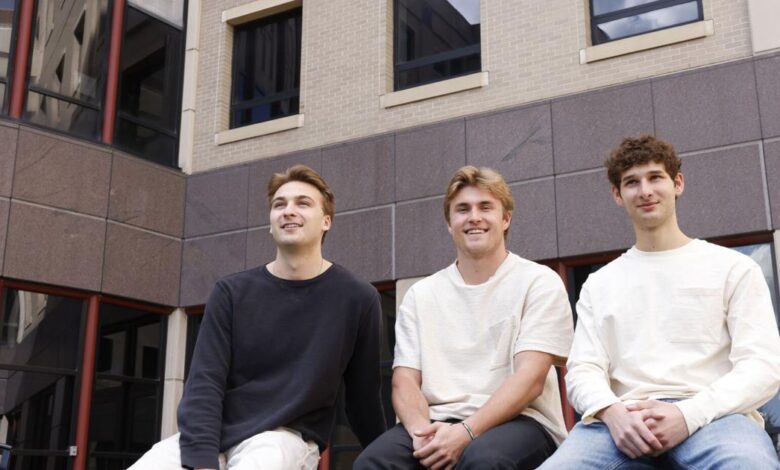UW-Madison entrepreneurs compete for $50,000 prize for job search app | Business

A team of University of Wisconsin-Madison students is heading to Minneaoplis next week for a national competition they hope could net $50,000 for their startup, SideShift. Like a dating app for jobs, the social media-inspired tool is designed to make it easier for small businesses to hire college students.
UW-Madison seniors Canyon Pergande and Nick Lawton launched SideShift last fall after seeing classmates frustrated in their search for a college job and local small businesses frustrated in their search for staff.
The pair noticed that many stores, restaurants and bars around campus don’t post jobs online or accept online applications. “They’re kind of forced to rely on a variety of hiring methods such as paper applications, resume drop-offs and word-of-mouth referrals,” said Pergande, 22, who works at The Kollege Klub, a popular college bar just steps from campus.
That strategy might work for businesses in “prime locations,” he said, “but for a lot of these other businesses, they really struggle to find and retain that college talent.”
Meanwhile, major job websites like Indeed, which can streamline the process for employers and job seekers, are geared toward big companies, Pergande said. Local job boards, like the one UW-Madison runs, help with advertising but nothing else.
The two wanted to design a platform for smaller companies, one that would bring in more applicants without more work. They pictured a tool that would not just let businesses post jobs but also accept applications, message applicants and offer them interviews. But neither Pergande nor Lawton knew how to code, so they brought on Drew Levin, a senior studying computer science and data science, as co-founder and chief technology officer.
Made by three University of Wisconsin-Madison undergrads, SideShift is like a dating app for jobs, designed to make it easier for Madison’s small businesses to hire college students.
The website they created is now in beta testing, with a mobile app slated to launch later this month. It allows students and employers to fill out their own profiles, uploading photos and videos if they want, making it “a lot more of a social hiring experience,” Pergande said.
For students, the profile serves as their resume, providing the basic information employers might need about their experience and skills. Students can browse the available opportunities in an Instagram-like feed, filter based on their interests and apply with a tap of the finger. Employers can follow up with applicants without leaving the platform.
Students and employers can both use SideShift for free, but employers pay a fee for each hire they make. Currently, the tool is only available to those with a “.edu” email address, but Pergande said he hopes to eventually serve other job seekers too.
So far, the platform includes a couple hundred students and 30 to 40 businesses, including Red Square Flowers floral shop and Comfort Fuel restaurant, Pergande said, adding that they’ve already gotten hires for a couple businesses.
Eyes on the $50,000 prize
SideShift is only about six months old, but already its founders have taken advantage of a variety of opportunities available to student entrepreneurs. They joined Ramp100, a startup-building cohort run through UW-Madison’s Entrepreneurship Science Lab, and they made their first formal pitch this month at student group Transcend UW’s annual innovation competition. Now they’re in the running in four more business contests, including making it to the third round of the statewide Governor’s Business Plan Contest.
Later this month, Pergande and Lawton will head to the University of St. Thomas in Minneapolis to face off against student entrepreneurs from across the country at e-Fest, one of the largest undergraduate student business plan competitions in the world. Running Thursday, April 18 to Saturday, April 20, the national event includes 25 teams who each compete in multiple contests.
The most money is on the line at Saturday’s Schulze Entrepreneurship Challenge, a “Shark Tank”-style competition offering a total of $215,000 in prize money and $50,000 for the first-place team.
“It’s a really, really exciting opportunity, and we’re hoping we can come away with some cash. That would be really big for the business as a whole,” Pergande said, noting that if they win anything, most of it would go to marketing and expanding the business.
But there are other needs coming up too, as he and his co-founders prepare to graduate next month. They plan to keep working on the business, but they’ll also have rent and living expenses to pay.
“It’d kind of be nice to maybe have to fundraise a little bit less money than we’re planning on, as we will need to kind of support us and the team as we start to build and grow.”



